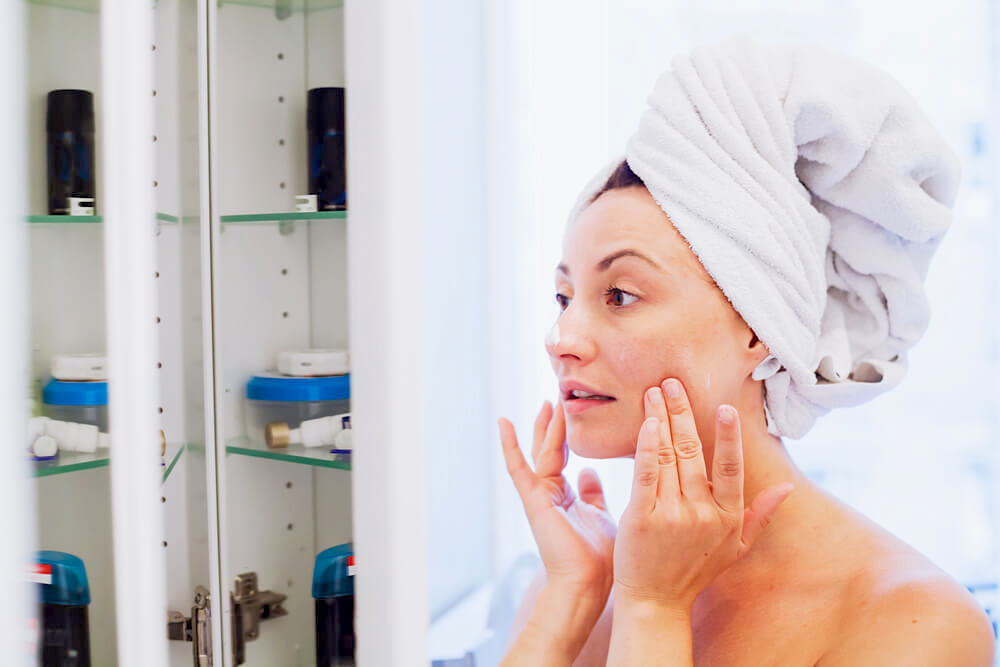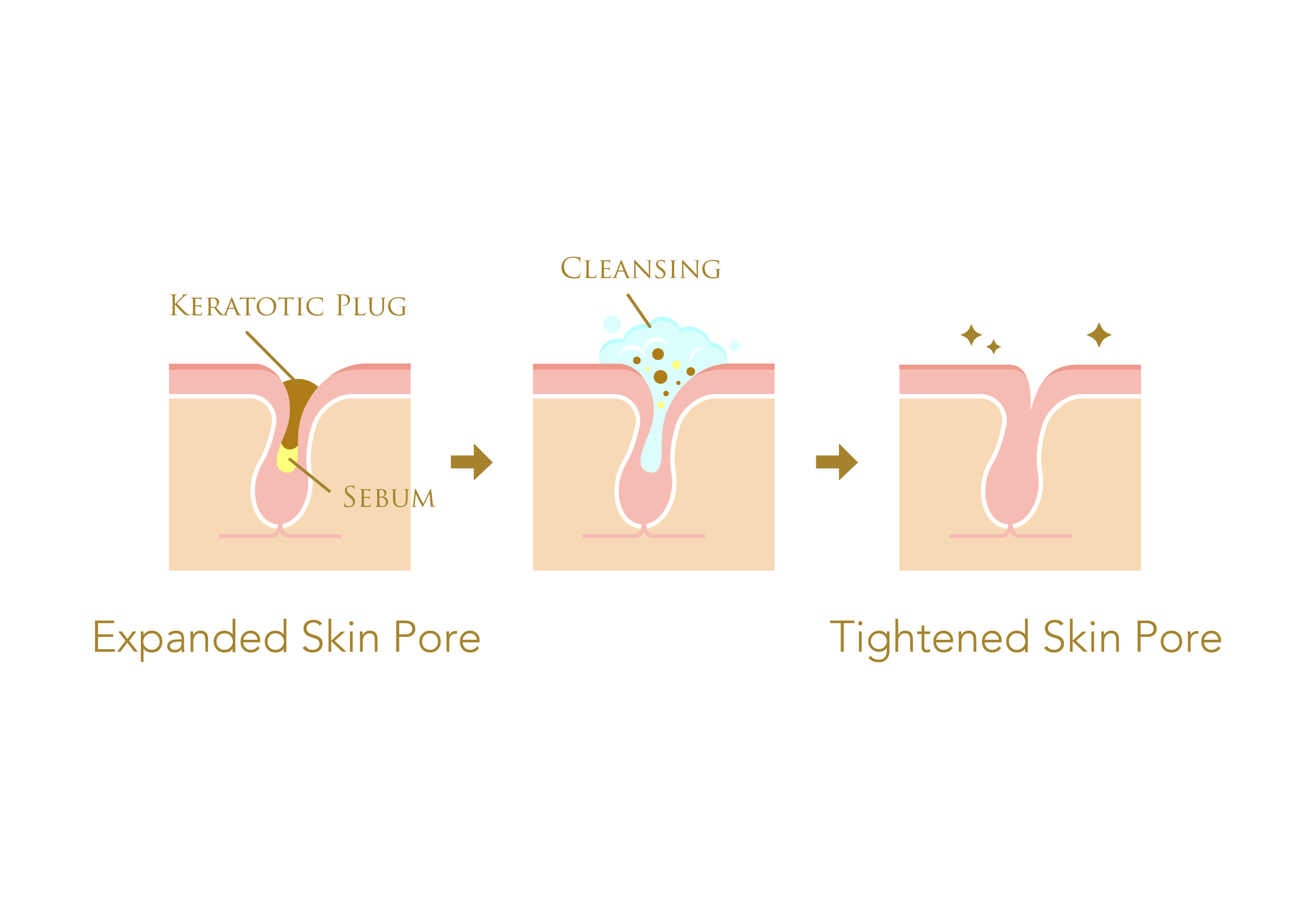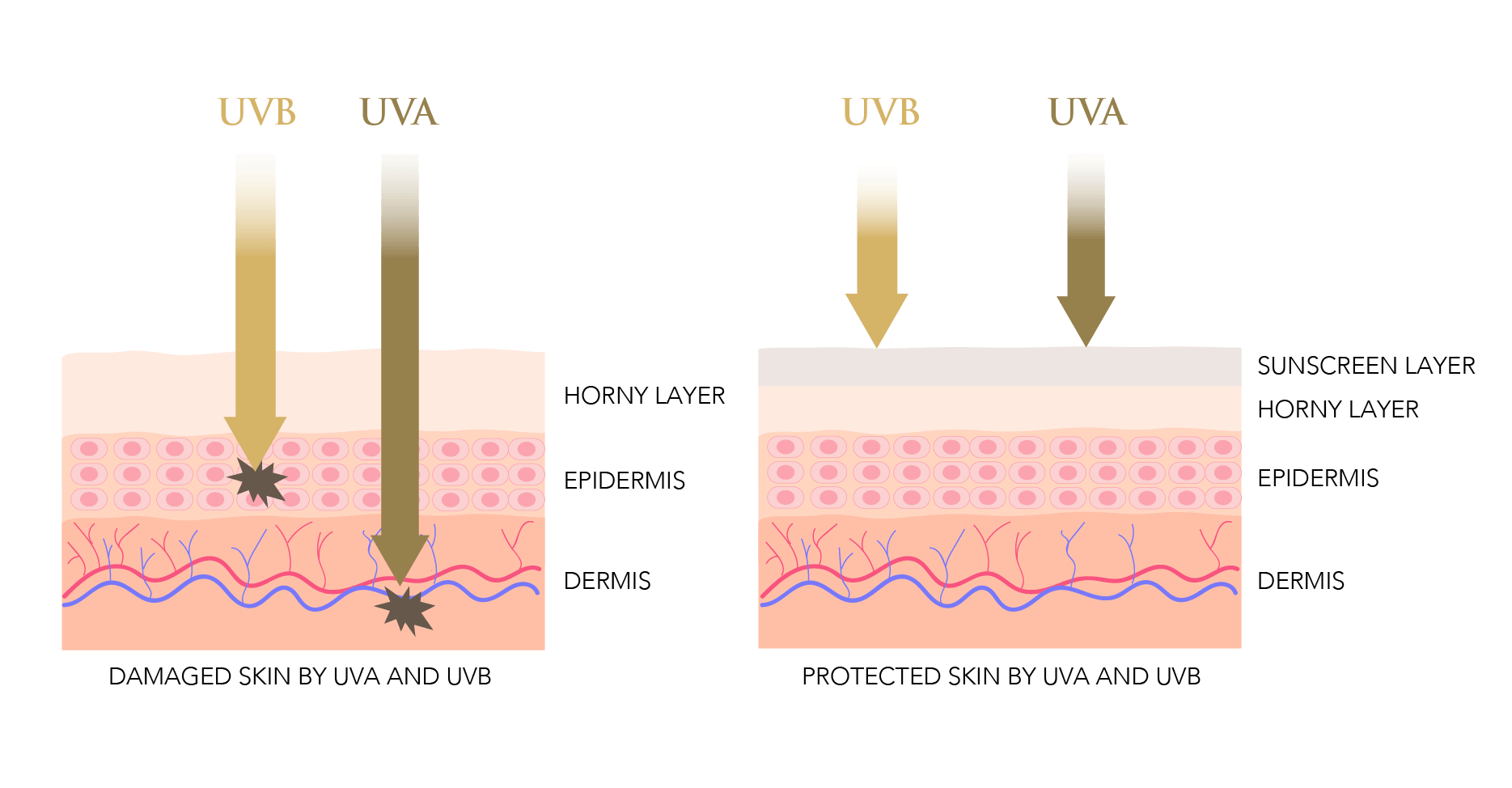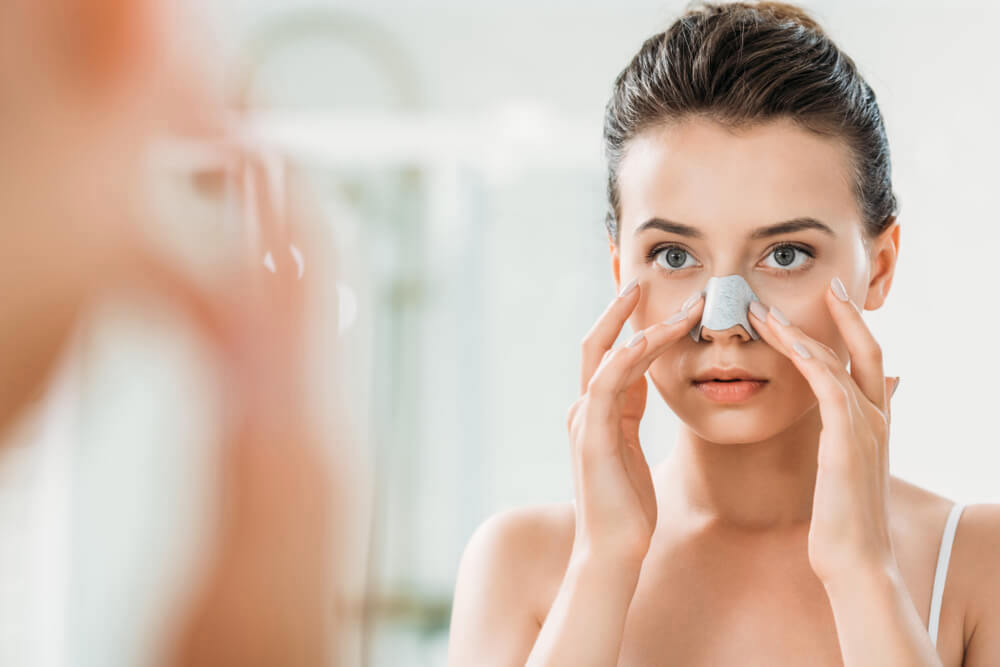Do You Have Enlarged Pores?

Pores are small openings in the skin that are connected to your hair follicles, and they can be found just about everywhere on your skin, apart from the palms of your hands and the soles of your feet.
Your skin contains two types of pores, one for releasing sebum, which is the natural oil produced by your body, and the other for releasing sweat.
While your genetics determine the actual size of your pores, it is easy for pores to appear enlarged due to a number of different factors. These can then make the skin appear quite unsightly, making it important to understand how to minimize enlarged pores.
What Causes Enlarged Pores?
There are a few main factors that cause enlarged pores.
These are:
- Excessive sebum production – this is when the skin’s oil glands produce too much oil, leading to this stretching the pores out
- Decreased skin elasticity around the pores – this prevents the pores from bouncing back to their smaller size once any blockages have been cleared away. This happens commonly with age
- Makeup – when makeup isn’t removed, the particles end up settling within pores, causing them to enlarge
- Sun exposure – UV rays from the sun damage the collagen and elastin within the skin, which would otherwise have kept your pores small and tight
- Skin trauma – simply picking at a pimple can cause trauma to your skin, and can sometimes permanently widen a pore
How to Tell If You Have Enlarged Pores?
If you have enlarged pores, it will be quite easy to recognize this.
Rather than the surface of your skin being smooth and even, you will be able to visibly see the tiny openings of each pore, leading to a rough complexion.
If you do have enlarged pores, then chances are that you are looking for a way to minimize these.
Fortunately, you have several options available to you…
How to Minimize Enlarged Pores
The methods of minimizing enlarged pores all target the main factors that cause pores to enlarge in the first place. The following tips will not only help you to make your pores less visible, but will also enable you to prevent them from enlarging again in the future.
1) Slow Down Your Skin’s Sebum Production
Do you have oily skin?
If your answer is yes, then this is because your skin tends to produce more sebum than other skin types. Not only does this lead to enlarged pores, but also to acne breakouts and other skin concerns.
So, how can you stop your skin from over-producing sebum?
There are a few ways in which you can go about doing this:
- Assess your skin care products – if you are using oil-based products, then this will not be helping your oily skin. Instead, try to switch to water-based skin care products, as this means that you won’t be applying any extra oil to your skin
- Use a gentle cleanser – it may be tempting to go for a potent cleanser that strips away all of the oils on your skin, but this will only trigger your skin to produce even more oils to compensate for this sudden dryness. Instead, look for a gentle gel cleanser that will hydrate and moisturize your skin in addition to cleansing it
- Make use of clay – clay is a fantastic ingredient for oily skin, as it acts like a magnet, drawing up and absorbing excess oil from the surface of the skin, as well as from within the pores
- Avoid dairy, sugar and refined carbs – these will all trigger your skin to produce more oil, due to their impact on your blood sugar levels
2) Cleansing and Exfoliating
Everything from excess oil and makeup to dirt and bacteria can end up causing blockages in pores, which stretches them out and enlarges them.
The best way to prevent this from happening is by regularly cleansing and exfoliating your skin.
Let’s begin with cleansing…
This should be done at the end of each day, although those with oily skin may need to cleanse twice a day.
Cleansing clears away any unwanted particles from the surface of your skin, preventing the majority of them from settling into your pores.

However, as effective as cleansing may be, some of these particles will still end up finding their way into your pores.
How do you get rid of them?
By exfoliating.
Exfoliation not only clears out your pores, but it also stimulates the skin into producing more collagen and elastin, which helps to keep your pores tight and elastic.
When it comes to the different methods of exfoliating…
AHAs and BHAs tend to be most effective at clearing out the pores.
What are they?
The letters stand for alpha hydroxy acids and beta hydroxy acids. They consist of different types of acids that work by dissolving the glue-like substance that holds oil, dirt and dead skin cells to the surface of the skin, enabling all of this to be washed away.
They both also clear out the pores, although BHAs are able to penetrate deeper into them.
You’re probably thinking…
This must mean that BHAs are better when it comes to minimizing enlarged pores!
Well, that actually all depends on your skin type. Due to the way in which BHAs travel deeper into pores, they can end up exacerbating dryness in those who have dry skin.
On the other hand, AHAs are much gentler, with the majority of AHAs also being humectants, meaning that they help to keep the skin hydrated.
When it comes to the popular AHAs out there, your options include:
- Glycolic Acid – penetrates deeper into the skin than the other AHAs, but can sometimes cause irritation because of this
- Lactic Acid – derived from milk and extremely gentle, making it perfect for those with sensitive skin
- Mandelic Acid – the least irritating of AHAs, mandelic acid also boasts antibacterial and antiviral properties
With BHAs, salicylic acid tends to be the main one used. This aspirin derivative is known for its anti-inflammatory benefits, making it effective at calming the skin.
How often should you be exfoliating?
Again, this depends on your skin type:
- Normal and Oily Skin – 2 to 3 times a week
- Dry Skin – 1 to 2 times a week
- Sensitive Skin – once a week
You should notice an immediate difference in pore visibility after exfoliating, but don’t let this tempt you into exfoliating more than the above guidelines.
Why?
Because over-exfoliating will only cause inflammation, redness and other types of skin damage, all of which won’t do your pores any favors at all.
3) Pore-Tightening Skin Care Ingredients
When it comes to keeping the opening of your pores small and tight, there are certain skin care ingredients that are able to really help with this.
One of these is niacinamide, which is also known as nicotinic acid and vitamin B3.
This ingredient is extremely effective at tightening the skin, with visible differences being seen when it comes to pore elasticity.
Retinol can also help. This vitamin A derivative encourages the skin to naturally exfoliate, therefore purging the pores of any substances within them. Retinol also helps to boost the production of collagen and elastin in the skin, therefore helping to keep the pore openings tight and elastic.
Vitamin C is another natural exfoliant, helping to keep the pores clean.
Retinol, niacinimide and vitamin C are commonly used in skin care products, making them relatively easy to find.
However, there are also some lesser-known ingredients out there that can help to shrink the opening of your pores…
Artichoke extract is one of these.
What does this do?
It contains an active compound called cynaropicrin, which stimulates the skin into producing specific antioxidants that help to increase the inner density of skin cells. This keeps the cells plumped up from within, which therefore makes pores less visible.
Siberian ginseng has also been shown to almost instantly minimize the appearance of pores, while lingonberry extract protects the skin’s elastin fibers from breaking down.
4) Always Wear Sunscreen
Sunscreen is something that everybody should be wearing on a daily basis, but this is even more the case if you frequently experience enlarged pores.
Why?
For a couple of different reasons:
- Sunscreen prevents the breakdown of collagen and elastin in the skin – as mentioned earlier, collagen and elastin are structural proteins within the skin, and they help to keep pore openings small and tight. However, UV rays from the sun break down the skin’s supplies of collagen and elastin, resulting in inelastic, enlarged pores
- Sunscreen prevents skin dehydration and dryness – the sun’s UV rays, along with the heat experienced, can quickly lead to skin dryness and dehydration. This will affect the texture of your skin, exacerbating the appearance of your pores
For a sunscreen to be effective, it needs to be broad spectrum, with an SPF of at least 30.
Make sure that you apply this to your skin first thing in the morning, and continue reapplying it every two hours through the day.

Think you don’t need to be wearing sunscreen today because it’s cloudy, or you are planning on staying outdoors?
Think again…
The sun’s UV rays are capable of penetrating through even thick cloud, as well as glass, making sunscreen a necessity each and every day.
5) Keep Your Skin Moisturized
Many people with oily skin don’t like to moisturize, worrying that this extra moisture will only end up making their skin even oilier.
However, a moisturizer is designed to help with your skin’s water content, and, as you know, water and oil are completely different.
A moisturizer actually helps the sebum that your skin produces to penetrate deeper into your pores, meaning that this doesn’t end up clumping together and blocking up your pores. This helps to keep pores less visible.
A moisturizer will also keep your skin well-conditioned and hydrated. Without this vital water content, your skin may try to over-compensate for the dehydration by producing even more sebum, which is definitely not what you want when trying to minimize your pores.
Of course, since your skin is oily, you do need to be careful about the moisturizer you choose…
Thick and greasy formulas will end up causing pore blockages, so make sure that you go for an oil-free, water-based moisturizer. A lighter formula, such as a lotion rather than a cream, will likely be more beneficial for your skin.
6) Use Pore Strips
The pores around the nose tend to end up clogged much more often than pores on the rest of the face, which is why blackheads in this area are a common skin issue.
While the other tips mentioned above are the best ways to prevent this from happening, you may sometimes need a quick fix when it comes to clearing clogged pores on the nose.
This is where pore strips come in…
They look similar to a band-aid, but one that has been designed for the nose and its surrounding area.
What do they do?
They contain a special adhesive that, when applied to the skin, sticks to any oil, dirt and hair that happens to be on the surface of your skin or within your pores. When you remove the strip, you are also removing all of these substances from inside your pores.

Wondering if they actually work?
Many are doubtful, but the answer is yes.
Of course, they are only a temporary solution, and, as mentioned above, will not prevent the pores from becoming clogged in the first place.
As you can see, there are several steps that you can take when it comes to dealing with enlarged pores. Not only are there many effective methods for minimizing the appearance of pores, but there are also techniques for preventing pore openings from becoming enlarged in the first place, giving you full control over how your pores look.

